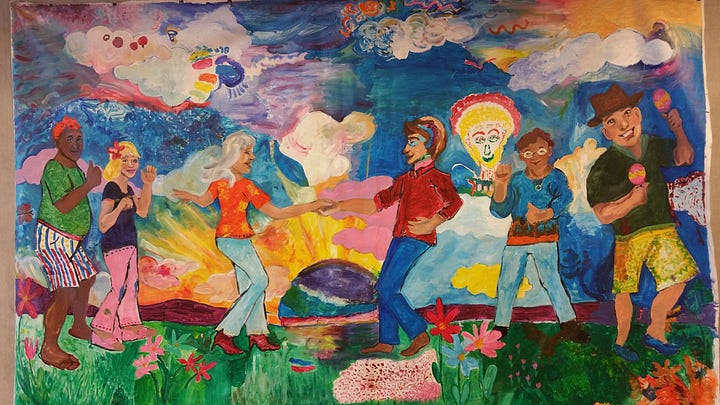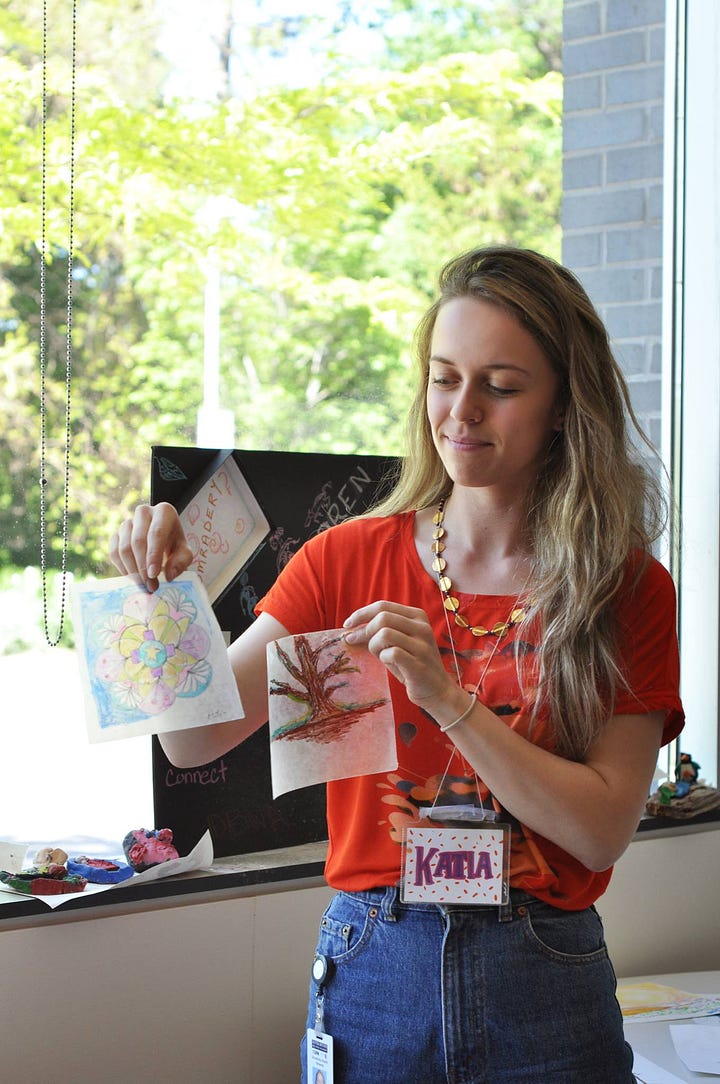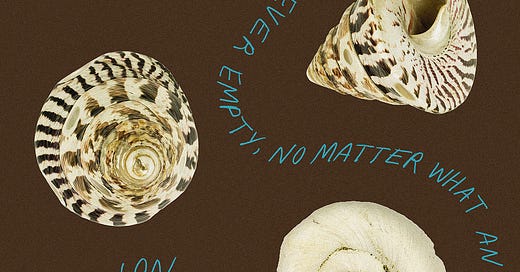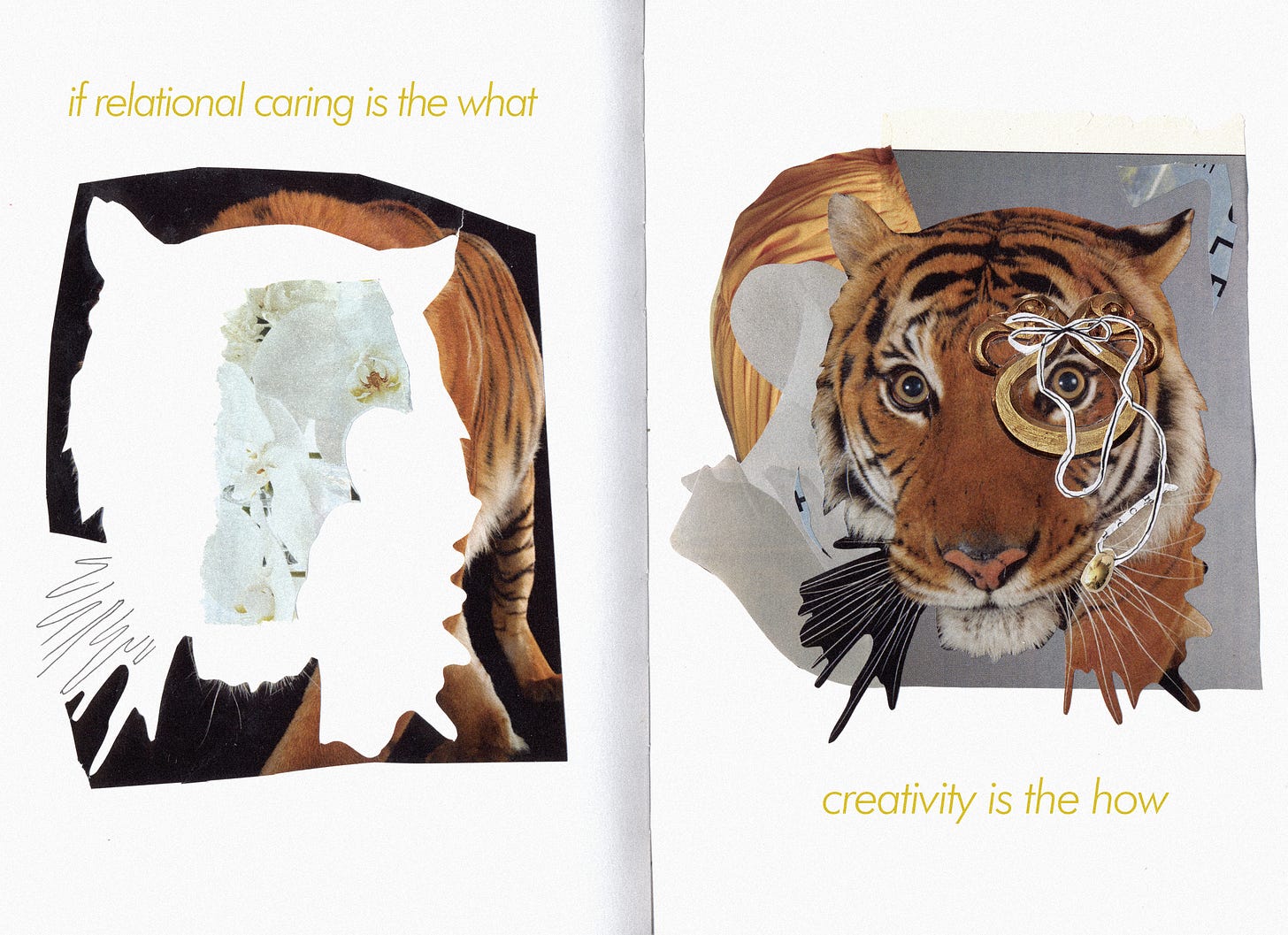no person is an empty shell
how I first learned about relational caring & why it's relevant to all of us
When I first learned about relationality, it was in the context of care. I was introduced to Relational Caring at The Dotsa Bitove Wellness Academy* (DBWA), which was where I first became immersed in working with people living with dementia.
I was 20 and had just moved home from a semester abroad. Having missed “the job market” for summer gigs that year, I followed a private client who started attending DBWA during my time away, and applied to volunteer.
The minute I stepped through the doors, resume in hand, I felt the warmth and unique spirit of DBWA. It was intentionally non-clinical, deeply entrenched in learning and the arts, and full to the brink with joy. My only other experience with spaces for older adults was my grandma’s long term care home, which was more or less what you’d expect from one: beige; sterile; a sprinkling of artificial “home-iness”; a stuffy feeling. DBWA in contrast was vibrant in all senses. It had giant windows overlooking a ravine and a big slice of sky. It had round tables for everyone to sit at and gather. Its walls reverberated with music and dancing and laughter.


While there are many factors that go into shaping a space that can hold all of this goodness, Relational Caring was at the forefront of DBWA’s intentional shift away from traditional, dehumanizing, bio-medical approaches.
By volunteering and later working at DBWA I learned about Relational Caring not through theory, but through seeing and doing - and it cracked me wide wide open.
Having grown up in some fairly competitive and unfriendly social settings, being in a space that so radically prioritized relationships and connection felt like finally landing where I was “meant to be”. DBWA is where I first felt like I could be myself and that my self was not only accepted, but celebrated.
I’m wary of how it might seem to discuss how Relational Caring was good for ME, as opposed to for people we serve working in this field. It’s thus important for me to acknowledge that this is in fact one of the core tenants of Relational Caring: it’s nourishing for EVERYONE in care arrangements.
From the individual living with dementia, to both formal and informal carepartners (key word here: partners, not givers), Relational Caring centers and honours the interdependent relationship(s) we inherently exist within, as well as every full and agentic human engaging in them. This is in stark opposition to the clinical, bio-medical approach of most care settings, where neither “patients/clients”, nor “workers” are honoured (except, maybe, doctors-as-experts). This plays out in bio-medical settings broadly - but is perhaps especially apparent where cognitive impairment such as dementia is part of the equation.
A traditional approach to care, coupled with the stigmas it both is informed by and perpetuates, veers us into some problematic territories:
Have you ever heard people with memory loss described as empty shells of themselves?
Have you ever heard people with memory loss described as being like zombies?
Or perhaps less aggressively: have you ever heard someone living with dementia described as being lost, or gone?
What happens when we veer into this territory is we DO lose sight of the agentic human behind the disease who has lived a full life and who continues to live life - but we cannot blame this erasure all on the dementia. No, it is us who lets them go. It us who stop giving them a chance to shine, to make meaningful decisions for themselves, to reciprocate care.
And spoiler alert: peoples’ shells are never empty, no matter what an un-curious eye may or may not see.
But if we assume “gone-ness” from people, we end up treating them as such. We are in fact, imposing it on them. We do not open the door for presence. We do not open the door for the capacities and offerings that we each hold.
Further, when people are seen as caring for people who “aren’t really there anymore”, their work itself becomes undervalued. The labour deemed unskilled. People thus work for abysmal pay, in part-time roles with no protections or benefits, barreling through the days trying to get everything done in the exact way the ministry requires them to. Workers, too, are denied the chance to shine, to make meaningful decisions aligned with their values, and to experience care in return.
Under this narrative, everyone’s humanity goes unacknowledged.
On the flip side, if we approach people with openness, with the intention of reciprocity, and without assumptions of what we do or do not have to offer, we set the stage for some reeeeeal good magic, my friends.
I’m going to tell you right now - this whole line of thinking goes for everyone you encounter in life. It’s not restricted to the dementia care setting, nor medical settings at large. If you’re not careful (please, for the love of good, do NOT be careful!!!), relationality and this way of caring will creep its way into all of your life.
Because isn’t it true? That we could ALL use a little more humanization under capitalism? A little more opportunity to act with agency and relate authentically? My work in dementia care oozes out to everywhere else I go.
Now - I know this project promises offerings around creativity, not just relationality. This particular dispatch has been relational heavy - but I have a little sweet treat for you on the creativity front. In writing this, I looked back and was able to find the cover letter I wrote when I first applied to volunteer at DBWA. I was surprised to see what I wrote:
“At a young age I was fortunate enough to be a camper in […] summer camps and extracurricular classes, where children both with and without [disabilities] participate in various creative activities. This opened me up to the world of art as something that not only helps the mind, but also brings people together.”
Right on, 20 year old me! I’ve been so lucky to learn so young that using the arts to connect - not compete, is where the magic lies. If Relational Caring is the what, creativity is the how. And when I say creativity, I don’t necessarily mean through the arts, but creativity in how we connect, how we think, how we meet another human being with our own, full, human selves.
So I leave you with something to chew on: when were you last creative in relationship with others? How might you open the door for more creative relating in your life?
Thank you, always, for giving me your time & brainspace today.
xx katia
*The DBWA is no longer in existence as it was, due to 2020 Covid-19 closures. We now operate under new leadership, collaborations, and a new name :)






Oh, dear Katia—thank you for sharing your story. What a treasure to be able to look back and find a version of yourself that's an echo of who you are now. In one of the sessions in the digital residency I'm currently in, one of the participants said something that stuck with me: "Echoes are the things that are worth chasing." I love how this is a thread you can pick up and weave into new experiences now.
I just love this so much 🐚👩🏻🤝👩🏼